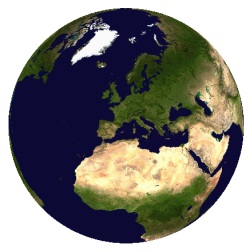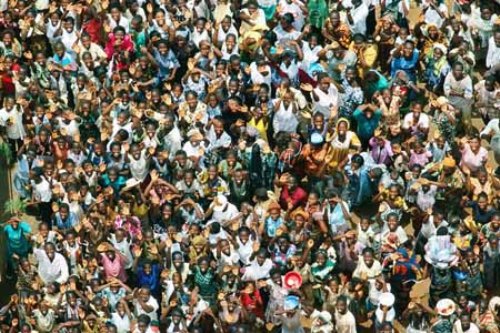Three billion inhabitans in Africa by 2100
This Monday, October 31st 2011, the planet passed the threshold of 7 billion inhabitants, according to the United Nations. Africa has the highest population growth rate in the world and at present it accounts alone for over one billion people. The stakes of this demographic development are high, for the world as well as for Africa.

 For the UN Secretary General, Ban Ki-Moon, the crossing of the 7 billion mark is not something to be taken lightly. «It is not a simple matter of numbers. It is an issue for mankind» », he said, speaking at a school in New York last week. “Seven billion people need food. Energy. Interesting opportunities for jobs and education. Rights and freedom. Freedom of expression. Freedom to bring up their children in peace and security. All the things that each one of us wish for ourselves, multiplied by 7 billion.»
For the UN Secretary General, Ban Ki-Moon, the crossing of the 7 billion mark is not something to be taken lightly. «It is not a simple matter of numbers. It is an issue for mankind» », he said, speaking at a school in New York last week. “Seven billion people need food. Energy. Interesting opportunities for jobs and education. Rights and freedom. Freedom of expression. Freedom to bring up their children in peace and security. All the things that each one of us wish for ourselves, multiplied by 7 billion.»
So if the stakes are high for the world, what about Africa? According to the UN, the African continent has the highest growth rate. Since 2009 it holds over one billion inhabitants and should reach 2 billion by 2004. Thus the planet will have more and more Africans. The National Institute for Population Studies (INED – l'Institut National d'Etudes Démographiques) estimates that the population of Africa will reach 3 billion by 2100.
At world level, as well as for Africa, the big question is whether there will be sufficient resources to feed all these people.
The Big Bluff !
Research workers and investors have taken statistics and satellite images as the basis for their statements that there is sufficient fallow land available, notably in Africa. In 2010 the World Bank quoted studies concluding that there are 445 million hectares of unused land with high agricultural potential, non forested, unprotected and inhabited by less than 25 persons per square km. This is a big bluff !
Satellite images do not show the ways in which land is used for itinerant cultivation, grazing, hunting, picking of wild plants and berries and other vital uses of allegedly «fallow land».
In many areas the key issue for agriculture is not land but water. Research by the German Society for International Co-operation (GIZ – Deutsche Gesellschaft fuer Internzionale Zusammenarbeit) on large scale land transactions in the Niger River region in Mali have shown that during the dry season no water remains unused. Water needed for the new irrigation projects will be taken out, to the detriment of traditional users in Mali and downstream in Niger and Nigeria. (Source : Information note from OXFAM of September 22, 2011, Land and Power).
Nevertheless foreign land acquisitions in Africa are expanding
The «land grab» trend in developing countries is growing and in particular in Africa, where 60 million hectares – the size of France – were given away in 2009.This is the conclusion of several research studies published by international NGOs in recent months. A report called «Understanding land investment deals in Africa» published by the American think-tank, The Oakland Institute in June this year, notes that land acquisitions are mainly the result of speculation by the same financial agencies which induced the world recession by inflating the housing bubble through risky manoeuvrings.» Referring to specific studies in Mali and Sierra Leone the Oakland Institute also highlights the effects of World Bank policies, which have »shaped the economic, financial and legal environment that opened the way for the acquisition of vast land areas by a few private investors.» The report points out the ease with which investors have been taking hold of land, often by making commitments that they do not honour. These operations hardly ever bring any of the benefits promised to the local population, but, on the contrary, lead to the eviction of smallholding farmers from their ancestral land, to clear the way for cultivation of export crops and particular bio-fuel» the report states.
To govern is to foresee
Today, as we learn that we are 7 billion inhabitants of our planet and that «soon» we will be 3 billion in Africa (three times as many as at present), one legitimate question arises: «What is the name of the game African heads of state are playing, allowing such looting of Africa»? ».
Merely complaining does not help. What is needed is a radical change of policy. Where will it come from?
We dedicate this newsletter to the Peoples' Forum which is just taking place in Mali and which has as one of its key themes «The land grab». We hope that it will produce some concrete proposals for action.
Koudougou, October 31st, 2011
Maurice Oudet
Director, SEDELAN









